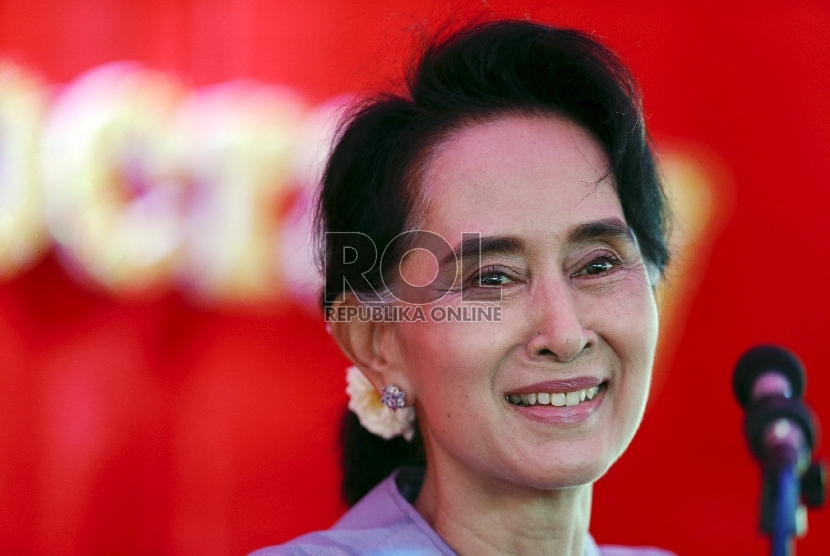REPUBLIKA.CO.ID, YANGON -- Myanmar's democracy champion Aung San Suu Kyi, moving closer to an absolute majority in parliament on Wednesday, requested a meeting with the president and the powerful military chief to discuss national reconciliation.
Suu Kyi's opposition National League for Democracy (NLD) has won over 90 percent of the seats declared so far in the lower house and is well ahead in the upper house and regional assemblies.
If the final results confirm the trend, Suu Kyi's triumph will sweep out an old guard of former generals that has run Myanmar since the junta handed over power to President Thein Sein's semi-civilian government in 2011.
But the army retains formidable power in Myanmar's political institutions after nearly 50 years of running the country and it is unclear how Suu Kyi and the generals will work together.
In letters to the commander-in-chief and the president dated Nov. 10 which the NLD released to media on Wednesday, Suu Kyi requested meetings within a week to discuss the basis of "national reconciliation."
"It is very important for the dignity of the country and to bring peace of mind to the people," Suu Kyi said in the letter.
President Thein Sein would meet Suu Kyi, said Zaw Htay, a senior official from the president's office. "It's just a question of when."
Relations between Suu Kyi and armed forces chief Min Aung Hlaing are said to be strained.
One of the biggest sources of tension between Suu Kyi and the military is a clause in the constitution drawn up by the former junta barring her from the presidency because her children are foreign nationals.
Few doubt the clause was inserted to rule her out.
While her letters seek conciliation, Suu Kyi has become increasingly defiant on the presidential clause as the scale of her victory has become apparent.
She has made it clear she will run the country regardless of who the NLD elects as president and described the constitution as "very silly".
"We'll find one," she told the BBC in an interview on Tuesday, referring to her choice of president. "But that won't stop me from making all the decisions as the leader of the winning party."
Results so far gave Suu Kyi's party 135 of 149 seats declared out of the 330 seats not occupied by the military in the chamber. Under the junta-crafted constitution, a quarter of the seats in both houses are unelected and reserved for the armed forces.
To form Myanmar's first democratically elected government since the early 1960s, the NLD needs to win more than two-thirds of seats that were contested in parliament.
The NLD has said it is on course for over 250 seats in the lower house, well above the 221 needed to control the chamber. Reuters was not able to independently verify the party's estimates of its own performance.
The ruling Union Solidarity and Development Party (USDP), created by the junta and led by retired soldiers, has conceded defeat in a poll that was a major milestone on Myanmar's rocky path from dictatorship to democracy.
Suu Kyi also requested a meeting with former USDP chairman Shwe Mann, the lower house speaker. He lost his seat, but before the election had been seen as a presidential contender.
He antagonized the military while in parliament and built close ties to Suu Kyi, arousing the suspicion of many in his party.
In addition to his bloc of parliament seats, the commander-in-chief nominates the heads of three powerful and big-budget ministries - interior, defense and border security.
The interior ministry gives him control of the pervasive bureaucracy, which could pose a significant obstacle to the NLD's ability to execute policy.
Among other formidable challenges for Suu Kyi is trying to put an end to decades of conflict with armed ethnic groups. Thein Sein failed to do that despite protracted talks that led to a ceasefire with some groups. The government's chief ceasefire negotiator, Aung Min, was among the heavyweight politicians that lost in the elections.
Sunday's vote was Myanmar's first freely contested general election since Thein Sein ushered in a period of reforms that prompted a partial lifting of international sanctions.
Money from abroad flowed in quickly afterward. Foreign direct investment stood at $8 billion in fiscal 2014/15, more than five times the flows recorded just two years earlier.
Washington welcomed the election as a victory for Myanmar's people, but said it would watch how the democratic process moved forward before lifting the remaining U.S. sanctions.
President Barack Obama has visited Myanmar twice in the past three years, hoping to make its democratic transition a legacy of his presidency and an element of his strategic "pivot" to Asia.
Final results are due no later than two weeks after Sunday's poll.


